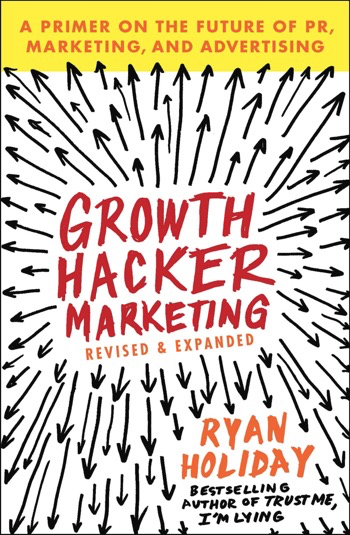 Growth Hacker Marketing, by Ryan Holiday is a synopsis of the advancing “growth hacker” trend in marketing. Holiday was a marketing VP at 25, “self taught, self made”, and distraught to learn that his professional title was being given to someone new, the “Growth Hacker”.
Growth Hacker Marketing, by Ryan Holiday is a synopsis of the advancing “growth hacker” trend in marketing. Holiday was a marketing VP at 25, “self taught, self made”, and distraught to learn that his professional title was being given to someone new, the “Growth Hacker”.
To oversimplify, marketing methods, for a long time now, have circled around the idea of grooming a product or service until it’s perfect, and then dramatically pulling the sheet off in a big ta-da moment. I for one, have always been a fan of that moment. But, the truth is, most of the time it doesn’t pay off. Holiday uses hollywood’s example to demonstrate.
Hollywood movies regularly cost millions of dollars, but only a fraction of them actually become blockbuster hits. That means they’re basically throwing shit against a wall and hoping some of it sticks so well that it makes up for the cost of all the rest that just disgustingly slid to the floor and pooled there.
In business, as in literal life, throwing shit against a wall is only really a good idea if you have no idea what else to do. But today, data could allow us to cherry pick the shit we’re going to throw. Okay, enough with the excrement analogies. The point is, where marketing is about hiding and making something you hope people will love, growth hacking is about iterating and making something you know people will love.
Growth Hacker Marketing isn’t a step by step guide, even if the chapters are labeled as steps. They’re not. Holiday explains early on:
This book is short because it sticks with the timeless parts… we will focus on the mindset— it’s far and away the most important part.
That it is. Growth Hacker Marketing is the first time I’ve been given a succinct understanding of what growth hacker means. If I had to give it my own definition, it would be someone who focuses on strategies that come with real data (so yes, magazine and billboard ads are off the table), focuses on building products and services which generate real data (no dice, if there’s no way to learn about how customers use, enjoy and share it), and who makes decisions for the good of the product, service and customer, based only on that data.
In traditional marketing, you don’t get started until you have something to sell. The growth hacker, on the other and, is there from day-one. They influence what the product is, what market it’s for, and aim for a ‘product market fit’ that has a capacity to go viral—the product itself, mind you, not the marketing for the product.
Growth Hacker Marketing was an easy read. For me, it was just shy of three hours. The book is divided into four “Steps”, dealing with Product Market Fit, identifying the best growth hack available, virality and customer retention. It’s an overview, but for some people, it’s all they’ll need to go in some dramatically new directions. It’s a perspective shifting text, and I think every business owner should read it.

Recent Discussion